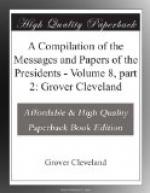GEORGE WASHINGTON.
UNITED STATES, June 11, 1790.
Gentlemen of the Senate and House of Representatives:
I have directed my secretary to lay before you a copy of the ratification of the amendments to the Constitution of the United States by the State of North Carolina, together with an extract from a letter, accompanying said ratification, from the governor of the State of North Carolina to the President of the United States.
GEORGE WASHINGTON.
UNITED STATES, June 16, 1790.
Gentlemen of the Senate and House of Representatives:
The ratification of the Constitution of the United States of America by the State of Rhode Island and Providence Plantations was received by me last night, together with a letter to the President of the United States from the president of the convention. I have directed my secretary to lay before you a copy of each.
GEORGE WASHINGTON.
UNITED STATES, June 30, 1790.
Gentlemen of the Senate and House of Representatives:
An act of the legislature of the State of Rhode Island and Providence Plantations, for ratifying certain articles as amendments to the Constitution of the United States, was yesterday put into my hands, and I have directed my secretary to lay a copy of the same before you.
GO. WASHINGTON.
UNITED STATES, August 4, 1790.
Gentlemen of the Senate;
In consequence of the general principles agreed to by the Senate in August, 1789, the adjustment of the terms of a treaty is far advanced between the United States and the chiefs of the Creek Indians, now in this city, in behalf of themselves and the whole Creek Nation.
In preparing the articles of this treaty the present arrangements of the trade with the Creeks have caused much embarrassment. It seems to be well ascertained that the said trade is almost exclusively in the hands of a company of British merchants, who by agreement make their importations of goods from England into the Spanish ports.
As the trade of the Indians is a main mean of their political management, it is therefore obvious that the United States can not possess any security for the performance of treaties with the Creeks while their trade is liable to be interrupted or withheld at the caprice of two foreign powers.
Hence it becomes an object of real importance to form new channels for the commerce of the Creeks through the United States. But this operation will require time, as the present arrangements can not be suddenly broken without the greatest violation of faith and morals.
It therefore appears to be important to form a secret article of a treaty similar to the one which accompanies this message.
If the Senate should require any further explanation, the Secretary of War will attend them for that purpose.




